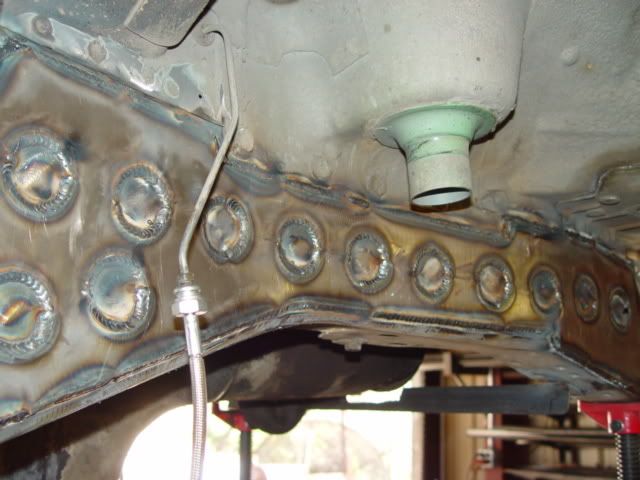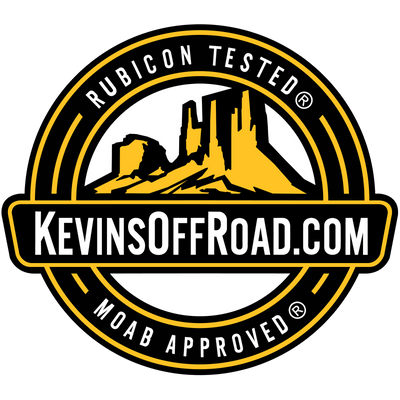I got this e-mail from a customer today, and thought I’d post it on our blog, so that others could benefit as well:
“I found out that my “new” zj has frame cracks at spring perches, near the steering box, rear spring perches, etc.Took to a very good jeep guy for welding. He wouldn’t do it, because he says the frame is galvanized inside and outside, and if he welded it, it would just crack again. Yet I read where people weld it all the time. What is the real story here? Are there actual frame repair kits? I spent $400+ on a variable steering box thinking the steering box was the issue-nope. Got a Teraflex replacement track bar for $200+[didn’t know about yours], only to find out someone had moved the bracket on the right side about two inches higher, so the Teraflex bar wouldn’t work. It had a 3″ Skyjacker lift when I got it, and the “expert” [he actually is] says that the subframe ZJ’s were never meant to be lifted, and that contributed highly to the cracked frame issue. Comments? advice? parts that would fix the problem? Thanks, I hope”
Our response:
Hey there. Sorry to hear about the problem you’re having with your new rig. Nothing sucks more than purchasing something that has more problems than you originally signed up for!!
The expert you spoke to is absolutely right…almost. “Galvanizing” is a process to keep oxidation from starting in on a metal piece…in this case, a very thin heat-treated piece of sheet steel (your unibody frame rail). When welding, the galvanizing will turn into a gas when heated, and will dissipate during welding, causing not only hazardous fumes, but also, more rust in the future (unless it’s re-treated with rust inhibitor).
However, that doesn’t mean that it’s safe to weld to the heat-treated “frame rail” without following a very careful process…
Before the Jeep is assembled, it’s assembled from bent pieces of steel, spot welded together, then heat-treated (cooled very slowly, over days, sometimes), to make the steel more rigid than it was previously in it’s “raw” form. When you heat the steel again (the welding process), it doesn’t cool (“anneal”) properly, and will be FAR weaker in the section that’s been welded, than what it was from the factory. So, merely welding up cracks is NOT going to be effective, and will indeed re-crack…typically on either side of the weld that was laid in to repair the first crack. So, yeah…that’s a dead end, for sure…he’s right about that!
So, what do you do? Well, assuming you already own the Jeep and you’re not able to avoid it, or return it, there is a process called “fish-plating” in conjunction with “stich-welding” or “skip-welding”, which reduces some of the “damage” caused by welding and not cooling the steel in a controlled environment, in a controlled time-frame, like the manufacturer did originally.
Fishplate Frame Repair
Fish Plating requires another piece of steel to be laid OVER the original piece with the cracks in it, to reduce the stress on that particular area…spreading the forces over a far greater area. Typically, you’d want to have the fish plate stretch as far past the cracks in both directions, as practically possible, particularly if you can tie it in to a cross-section or thicker part of the frame rail. Here’s an image of a fishplate frame repair, but it’s also fully welded (you don’t want to fully weld it!)
What you’ll want to do, to keep the heat down, and to strengthen the repair, is to use a “skip weld” or “stitch weld” process, which means you weld a short section, skip a section, weld another section, skip another section, and so on. Typically you’d want to weld AROUND the corners of the fishplate (so that it doesn’t twist or pull up under stress), and leave the long sections welded in a stitch pattern. Here’s an image of a stitch weld (also called skip-weld). By using a stitch-weld (or skip-weld), you reduce warpage, you reduce heat build-up and the possiblty of burning through the frame rail completely, and you reduce the amount of annealing that you’re removing from the factory heat-treated frame rail. Though it may look “weak” to an untrained eye, it’s actually a MUCH stronger repair in this case, because you didn’t change the temper of the entire area around the fishplate, which would make it brittle…you ONLY tempered the areas that the weld touched, and a small perimeter around it. That leaves the “open” areas still rigid, and the fishplate serves as a stress-reducer on the areas underneath which already have the cracks in it great post to read.
You can also use a “Plug weld” technique on your fishplate, with success. Here’s a really nice example on an JeepSpeed XJ Cherokee:

Rosette Weld Fish Plate from Pirate4x4.com



4 comments
I just purchased a 96 Jeep Cherokee ZJ, and although I was informed of the rusted out section near the passenger door where it bends up to clear the suspension, I didn’t do my homework, and after further investigation found out it’s a unibody. I’ve cleaned it up real well and had a neighbor look at it who’s a metal building erector, and he kind of grunted. Even though both he and his son are certified welders, not sure they are too enthusiastic about helping me fab something up and welding it. I don’t know if you’ve gotten any others interested in some laser-cut and bent sections, but I would be interested if you do.
Thanks, Don